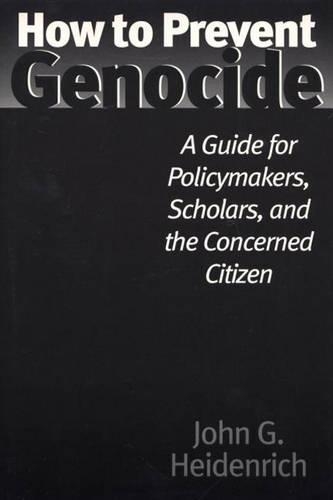
How to Prevent Genocide: A Guide for Policymakers, Scholars, and the Concerned Citizen
(Hardback)
Publishing Details
How to Prevent Genocide: A Guide for Policymakers, Scholars, and the Concerned Citizen
By (Author) John G. Heidenrich
Bloomsbury Publishing PLC
Praeger Publishers Inc
30th April 2001
United States
Classifications
Tertiary Education
Non Fiction
Peace studies and conflict resolution
International relations
327.172
Physical Properties
Hardback
296
Description
Genocide--the deliberate destruction, usually through mass murder, of an ethnic, racial or religious group--is the ultimate crime against humanity. Drawing upon a wide variety of disciplines, this study assesses ways to prevent this crime. While most books about genocide focus on the history of a particular event, such as the Holocaust, or compare case studies to derive empirical theories, this book outlines many practical aspects of genocide prevention. Heidenrich covers a broad spectrum of expert opinions, from Stanley Hoffmann to Henry Kissinger, as well as political opinions regarding genocide that range from Ronald Reagan to Bill Clinton. Topics include international law, humanitarian intervention, early warning measures, and the effectiveness of such methods as diplomacy, economic pressure, and nonviolent resistance. Preventing genocide in a tense socio-political environment is no easy task, but such prevention is easier and more cost-effective than trying to put an end to genocide once it is already occurring.
Reviews
"In the vast literature on ethnic and religious massacres, Heiderich's book is distinguished both by its sense of moral urgency and by the realism of its evaluation of what can be done to prevent genocide. He has no illusions about the obstacles, yet he presents a convincing set of proposals for early warnings, non-violent pressures, and an international legion of volunteers. This is a strong and moving call for awareness, concern, and action." Stanley Hoffman, Paul and Catherine Buttenwieser University Professor, Harvard University.
Author Bio
John G. Heidenrich is the Senior Analyst for Genocide and Instability Warning Issues at Open Source Solutions (OSS), Inc., an international consulting firm.
